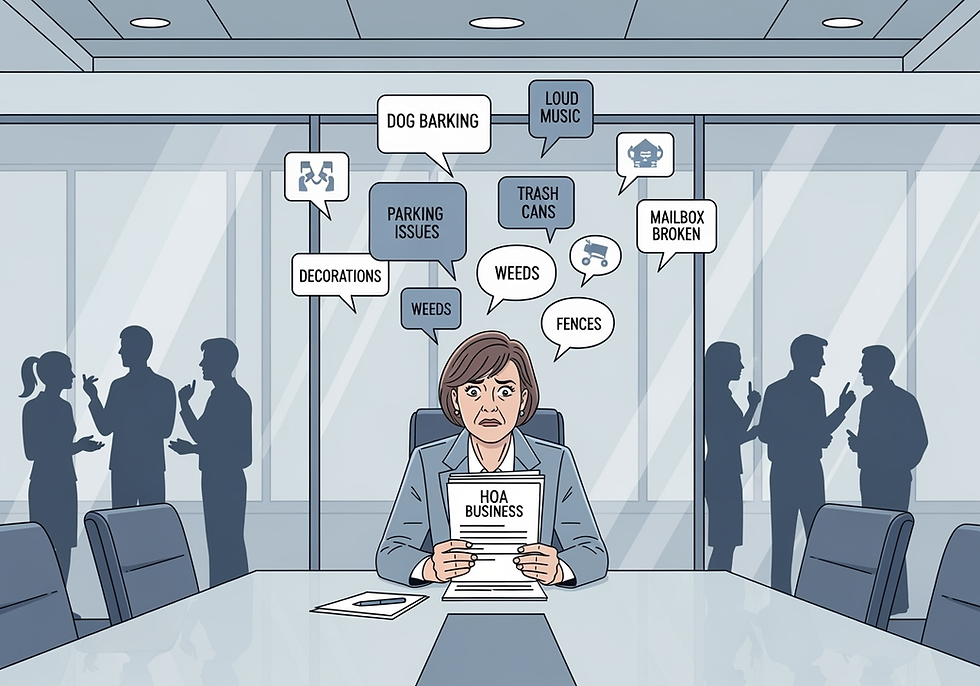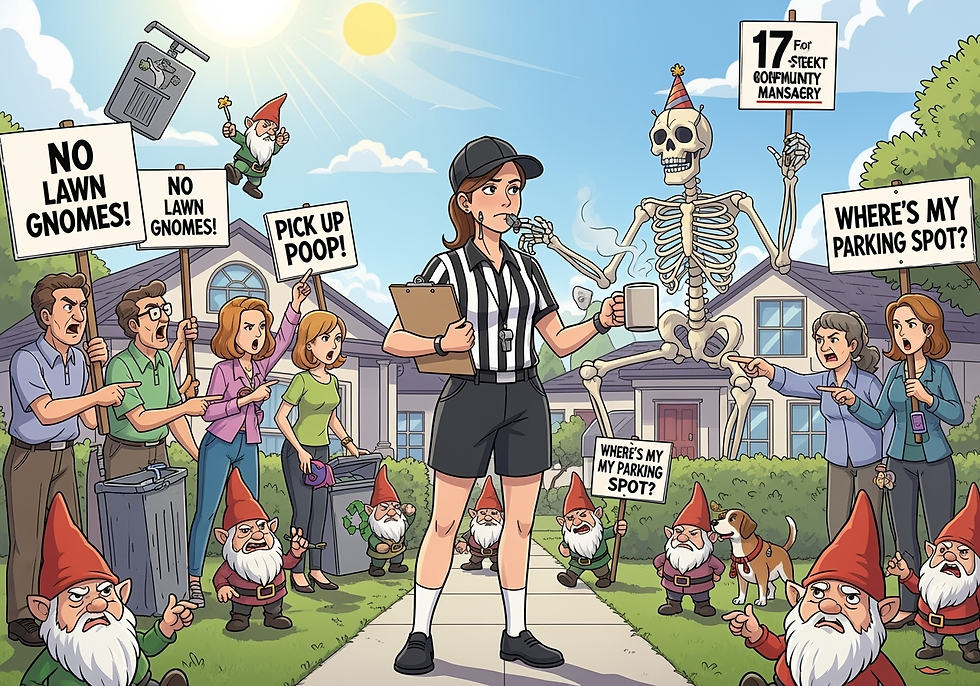The Unspoken Struggles of Board of Trustees: When Every Neighbor Issue Lands on Your Doorstep
- Katie Harevich
- Aug 8
- 4 min read

Serving on a Board of Trustees for your homeowners or condominium association is supposed to be about maintaining property values, managing budgets, and ensuring the community runs smoothly. But if you've ever served on a board, you know the reality is quite different. Your inbox becomes a dumping ground for every grievance, complaint, and minor inconvenience that occurs within your community – even when half of these issues have nothing to do with association business.
The "Everything is Board Business" Mentality
One of the biggest frustrations trustees face is the misconception that every problem within the community automatically becomes a board responsibility. Residents seem to believe that because you volunteered to serve, you're now the official mediator, referee, and problem-solver for all neighborhood disputes.
Consider these common scenarios that land in trustees' laps:
"My neighbor's dog barked at 7 AM on Saturday"
"Someone parked too close to my car in the visitor spots"
"The people upstairs are walking too loudly"
"My neighbor's holiday decorations are tacky"
"Someone didn't hold the elevator for me"
Here's the thing: most of these complaints aren't violations of your association's governing documents. They're simply part of living in a community with other human beings. Yet somehow, residents expect the board to wave a magic wand and solve interpersonal conflicts that could be resolved with a simple, respectful conversation.
The Lost Art of Neighbor-to-Neighbor Communication
What's particularly frustrating is watching issues escalate unnecessarily because people refuse to have direct conversations with their neighbors. Instead of knocking on a door and saying, "Hey, I noticed your music was pretty loud last night – could you keep it down after 10 PM?" residents immediately fire off angry emails to the board demanding action.
This avoidance of direct communication creates several problems:
Minor issues become major conflicts
The board gets dragged into personal disputes
Community relationships deteriorate
Board members become overwhelmed with non-board matters
Real association business gets pushed to the back burner
When Board Intervention Actually Makes Sense
Don't get me wrong – there are absolutely times when board involvement is necessary and appropriate. These include:
Clear violations of association rules or bylaws
Issues affecting common areas or shared resources
Financial matters related to association operations
Maintenance and repair responsibilities outlined in governing documents
Safety concerns that impact the entire community
Disputes involving association property or services
The key is understanding the difference between legitimate association business and personal conflicts that happen to occur within association boundaries.
Setting Healthy Boundaries
Successful boards learn to set clear boundaries about what constitutes board business. This means:
Educating residents about the difference between association responsibilities and personal neighbor disputes. Consider creating a simple guide that outlines what types of issues warrant board attention versus those that should be handled directly between neighbors.
Encouraging direct communication by suggesting residents attempt to resolve minor issues through respectful conversation before involving the board. You might be surprised how many problems disappear when people actually talk to each other.
Establishing clear procedures for legitimate complaints, including documentation requirements and escalation processes. This helps filter out frivolous complaints while ensuring real issues get proper attention.
Redirecting appropriately by politely explaining when an issue falls outside board jurisdiction and suggesting alternative solutions, such as mediation services or direct neighbor communication.
The Emotional Toll
What many people don't realize is the emotional burden that comes with constant complaints about non-board issues. Trustees are volunteers who already dedicate significant time to legitimate association business. When their personal time gets consumed by petty neighbor disputes, it leads to:
Burnout and frustration
Difficulty recruiting new board members
Rushed decisions on important association matters
Strained relationships within the community
Good people stepping down from board service
A Call for Community Responsibility
Here's what every association resident needs to understand: your Board of Trustees isn't your personal conflict resolution service. They're volunteers trying to maintain and improve your community within the scope of their actual responsibilities.
Before you send that complaint email, ask yourself:
Is this actually a violation of our association's rules?
Does this impact common areas or association property?
Have I tried talking directly to my neighbor about this issue?
Am I expecting the board to solve something I could handle myself?
The Path Forward
The most successful communities are those where residents take personal responsibility for minor conflicts and save board involvement for legitimate association business. When neighbors communicate directly and respectfully with each other, amazing things happen:
Issues get resolved faster
Relationships improve instead of deteriorate
Board members can focus on important association matters
The overall community atmosphere becomes more positive
People actually enjoy living there
Final Thoughts
Serving on a Board of Trustees should be about stewardship of your community's shared interests, not mediating every minor inconvenience between neighbors. By understanding the appropriate scope of board responsibilities and encouraging direct neighbor communication, we can create communities where trustees can focus on what really matters – and where residents take ownership of their role in maintaining a harmonious living environment.
Remember: good neighbors don't need a board to tell them how to be considerate. They just need the courage to have honest, respectful conversations with each other.



Comments